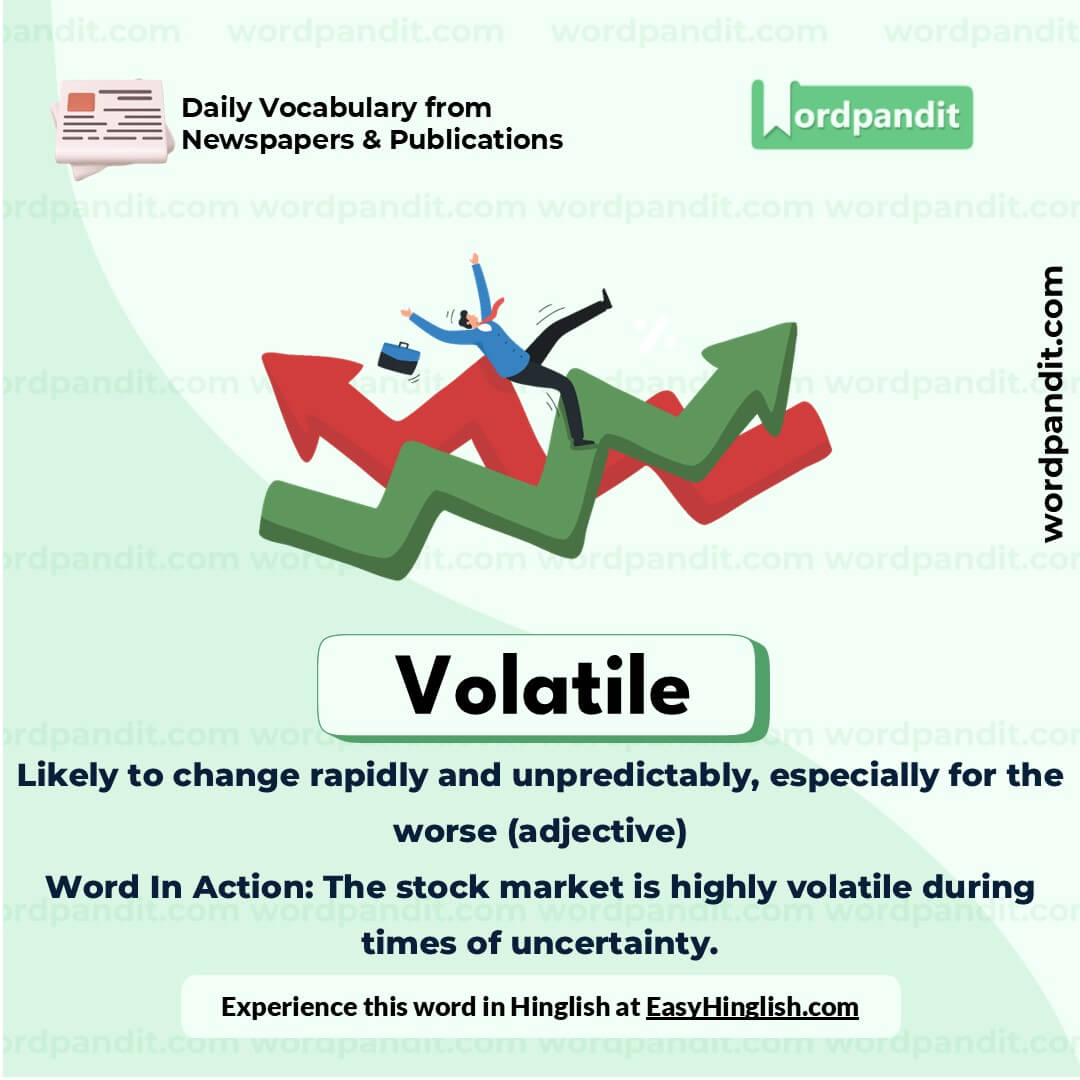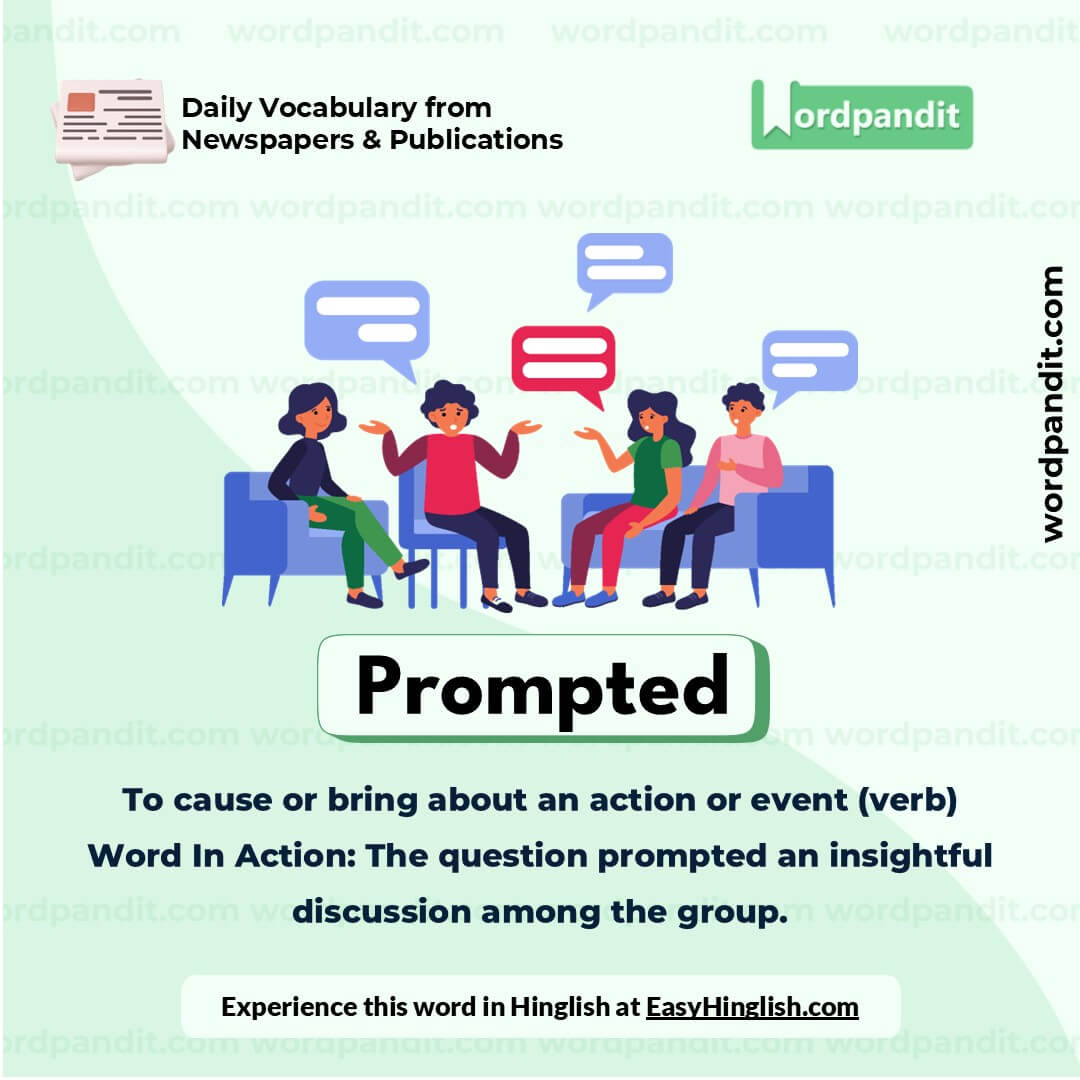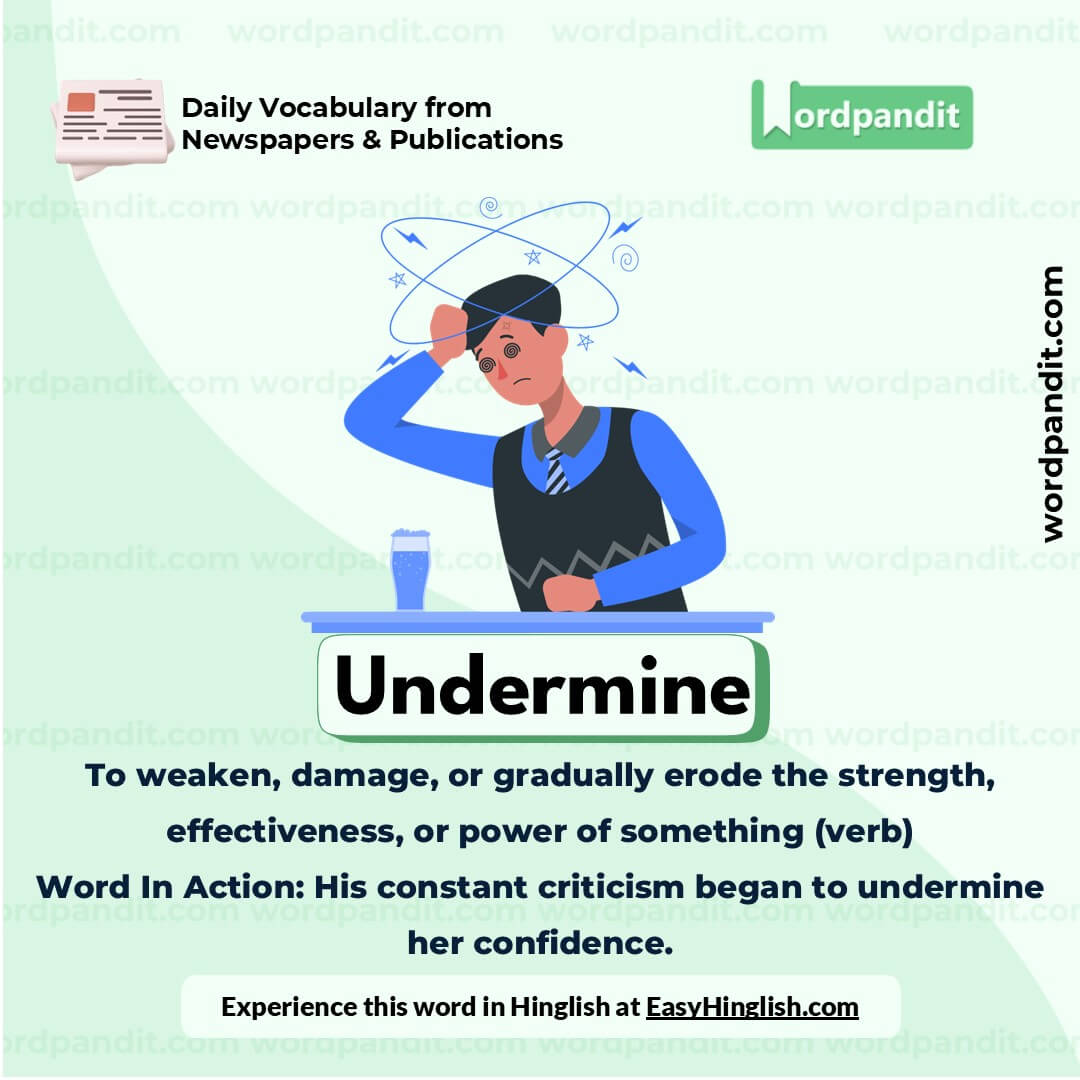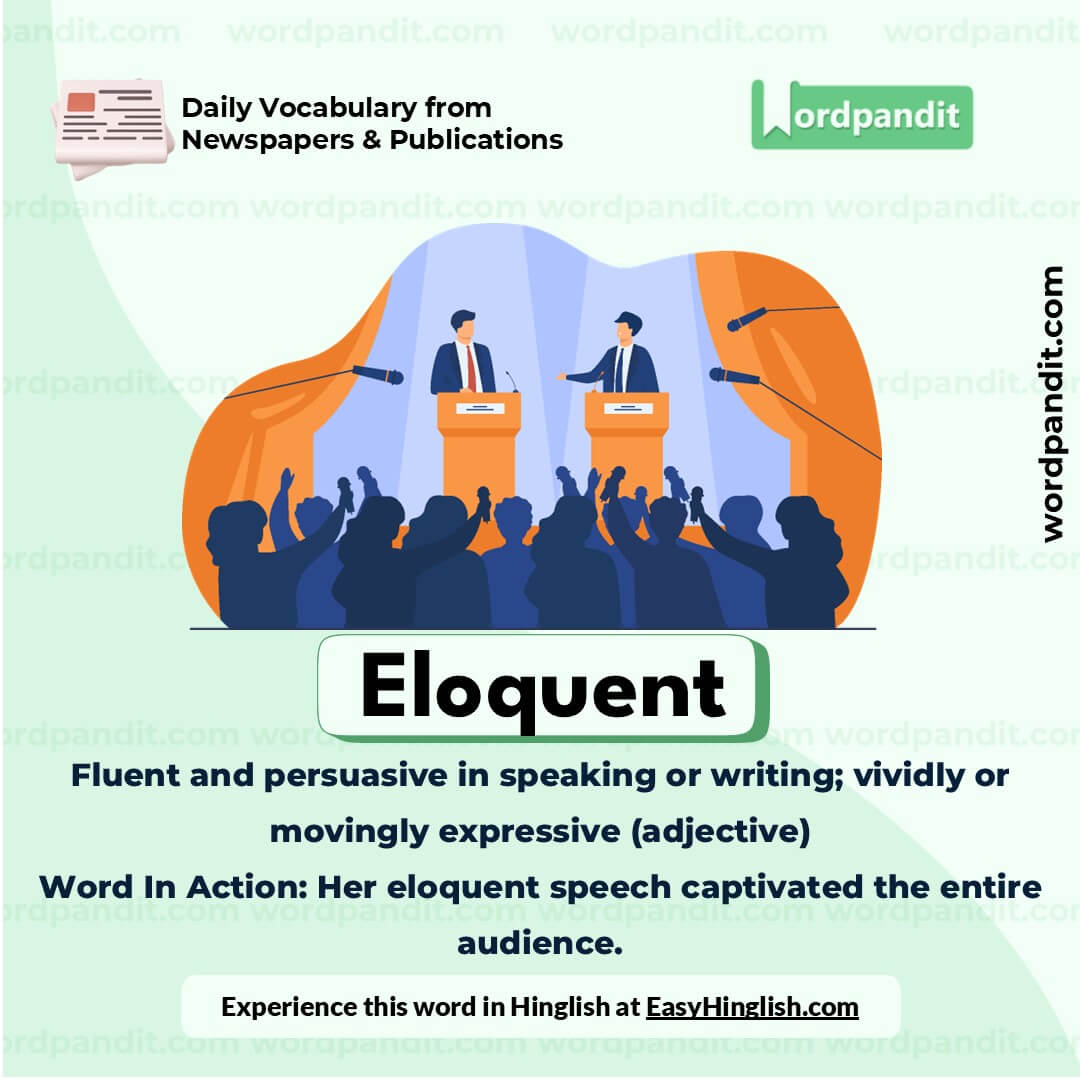Daily Vocabulary from Indian Newspapers and Publications
Welcome to Wordpandit’s Indian Vocabulary Hub
At Wordpandit, we understand the importance of staying rooted in the local context while expanding your language skills. This section focuses on enriching your vocabulary with words and phrases drawn from India’s leading newspapers and publications, ensuring you're learning vocabulary that is practical, relevant, and uniquely Indian.
Why Indian Sources Matter
We believe that the best way to master any language is by immersing yourself in local content. That’s why we carefully curate vocabulary from top Indian publications, including:
- The Hindu
- The Times of India
- The Economic Times
- Hindustan Times
- Live Mint
- The Indian Express
- And many others...
Stay Updated, Stay Relevant
With daily updates from Indian news sources, you’ll be consistently learning words that reflect the trends and shifts in Indian society and culture. Our focus is to provide vocabulary that enhances your understanding of the language in an Indian context.
How Wordpandit Supports Your Goals
Whether you’re preparing for exams, aiming to improve your professional communication, or simply want to stay connected with the latest Indian vocabulary, Wordpandit is here to guide you every step of the way.
Learn with a Practical Approach
Our interactive learning methodology includes real-world examples, engaging activities, and context-specific usage to ensure that every word becomes part of your active vocabulary.
Dive into Indian Vocabulary Today!
Why Choose Wordpandit?
Practical Learning: Focus on words you'll actually encounter in real-world reading, enhancing your comprehension and communication skills.
Diverse Content: From current affairs to scientific breakthroughs, our varied sources expose you to vocabulary across multiple domains.
Effortless Integration: Make Wordpandit a part of your daily routine. Just a few minutes each day can significantly boost your lexicon over time.
Your Path to Vocabulary Mastery
- Visit our Daily Vocabulary section regularly
- Explore new words and their usage in context
- Practice incorporating these words into your own writing and speech
- Track your progress as your vocabulary expands
Start Your Journey Today
Embark on your vocabulary enhancement journey with Wordpandit. By consistently engaging with our daily posts, you'll build a robust vocabulary that serves you well in academic, professional, and personal contexts.
Remember, a word a day keeps linguistic limitations at bay. Make Wordpandit your daily companion in the quest for vocabulary excellence!
WORD-1: Volatile
Context:
"While the markets remained volatile due to concerns over inflation and fiscal deficits, domestic demand and policy measures provided stability." - The Financial Express
Explanatory Paragraph:
The word "volatile" describes a state of unpredictability or instability, often used to characterize situations or substances that can change rapidly or unexpectedly. In the given context, it refers to the fluctuating nature of financial markets influenced by external factors like inflation and fiscal deficits.
Meaning: Likely to change rapidly and unpredictably, especially for the worse (adjective).
Pronunciation: VAH-luh-tile
Difficulty Level: ⭐⭐⭐ Intermediate
Etymology: From the Latin word "volatilis," meaning "flying" or "swift," derived from "volare," meaning "to fly."
Synonyms & Antonyms:
Synonyms: Unstable, unpredictable, erratic, capricious
Antonyms: Stable, predictable, consistent, steady
Usage Examples:
- The stock market was extremely volatile after the announcement of new trade tariffs.
- He avoided discussing volatile topics like politics during the family dinner.
- In chemistry, volatile substances easily evaporate at room temperature.
- The region's volatile climate makes agriculture challenging.
Cultural Reference:
"Volatility is greatest at turning points, diminishing as a new trend becomes established." - George Soros, a famous investor, emphasizing the dynamic nature of markets.
Think About It:
How does the concept of volatility apply differently in financial markets versus human emotions?
Quick Activity:
List three examples of volatile situations from different fields (e.g., finance, chemistry, weather) and explain why they are described as volatile.
Memory Tip:
Think of "volatile" as something that "flies off" unpredictably, just like a bird (volare = fly in Latin).
Real-World Application:
In the real world, volatility is commonly used in finance to describe fluctuating markets, in science to discuss substances with high vapor pressure, and in daily life to characterize unstable situations or relationships.
WORD-2: Prompted
Context:
"Azure Power's internal probe, prompted by whistleblowers, uncovered employee misconduct and potential improper payments related to a solar project in Andhra Pradesh. The company shared its findings, which included evidence of data manipulation, with the US Department of Justice. Azure surrendered the project to SECI, citing the investigation, and it was later awarded to Adani Green." - The Economic Times
Explanatory Paragraph:
The word "prompted" means to cause or initiate an action, reaction, or event. In this context, whistleblowers' revelations led to an internal investigation by Azure Power, uncovering significant misconduct related to a solar project.
Meaning: To cause or bring about an action or event (verb).
Pronunciation: PROMT-ed
Difficulty Level: ⭐⭐ Beginner
Etymology: From Latin "promptus," meaning "ready," derived from "promere" (to bring forth).
Synonyms & Antonyms:
Synonyms: Triggered, caused, initiated, spurred
Antonyms: Discouraged, hindered, prevented, delayed
Usage Examples:
- The rise in fuel prices prompted the government to consider subsidies.
- Her curiosity prompted her to explore new areas of research.
- The teacher’s question prompted a thoughtful discussion among the students.
- The unexpected storm prompted residents to evacuate the area.
Cultural Reference:
The term "prompted" is often associated with storytelling or drama, where a "prompter" provides actors with cues, highlighting its link to initiation and guidance.
Think About It:
What role do whistleblowers play in prompting organizational or societal change, and how should they be protected?
Quick Activity:
Write two examples of events in your life where something prompted you to take a specific action. Reflect on the outcomes.
Memory Tip:
Think of "prompted" as a "prompt" on a computer screen that triggers you to respond, symbolizing cause and effect.
Real-World Application:
The word "prompted" is commonly used in journalism, investigations, and day-to-day conversations to explain why actions or decisions were made, emphasizing causation.
WORD-3: Undermine
Context:
"In fact, the BJP and its ecosystem will do well not to harp on the fiction that US courts and market institutions are in some way trying to undermine India‘s progress." - The Wire
Explanatory Paragraph:
The word "undermine" refers to weakening or eroding the foundation, power, or effectiveness of something, often subtly or indirectly. In this context, the term implies accusations of efforts to damage India's progress through external systems, such as courts or markets, but these claims are dismissed as fiction.
Meaning: To weaken, damage, or gradually erode the strength, effectiveness, or power of something (verb).
Pronunciation: UN-der-mine
Difficulty Level: ⭐⭐⭐ Intermediate
Etymology: From Old English "under" (below) and "minan" (to mine), referring to digging beneath a structure to collapse it.
Synonyms & Antonyms:
Synonyms: Weaken, sabotage, erode, subvert
Antonyms: Strengthen, bolster, reinforce, fortify
Usage Examples:
- Criticizing team members in front of others can undermine their confidence.
- The scandal threatened to undermine public trust in the government.
- Excessive spending could undermine the financial stability of the company.
- The rebels sought to undermine the authority of the ruling party.
Cultural Reference:
The term "undermine" is often used in political discourse, such as during the Cold War, where nations accused each other of undermining their governance through espionage and propaganda.
Think About It:
Why do you think subtle actions, rather than direct attacks, are often more effective in undermining someone or something?
Quick Activity:
Write an example of a situation where one person's actions unintentionally undermined another's efforts. Reflect on how it could have been avoided.
Memory Tip:
Picture a miner digging beneath a castle to weaken it. "Undermine" literally means to dig under, helping you recall its meaning.
Real-World Application:
"Undermine" is frequently used to discuss political, social, and workplace dynamics where actions, policies, or words weaken relationships, trust, or institutions.
WORD-4: Conflate
Context:
"Gersberg, the microbiologist at SDSU, warned not to conflate sewage with toxic industrial chemicals." - The Wire
Explanatory Paragraph:
The word "conflate" means to combine two or more distinct ideas, concepts, or things into one, often incorrectly or misleadingly. In the context, Gersberg advises against merging the concepts of sewage and toxic industrial chemicals, emphasizing their differences for clarity.
Meaning: To mix or merge (especially ideas or concepts), often in a way that causes misunderstanding (verb).
Pronunciation: kun-FLAYT
Difficulty Level: ⭐⭐⭐ Intermediate
Etymology: From the Latin "conflatus," meaning "blown together," derived from "conflare" (to blow together), a combination of "con-" (together) and "flare" (to blow).
Synonyms & Antonyms:
Synonyms: Mix, blend, merge, fuse
Antonyms: Differentiate, separate, distinguish, segregate
Usage Examples:
- It's important not to conflate correlation with causation in scientific research.
- Many people conflate personal opinions with facts, leading to misinformed debates.
- The historian warned against conflating myths and historical events without evidence.
- Some argue that conflating technological progress with societal improvement can be misleading.
Cultural Reference:
The term "conflate" often appears in debates, such as political discourse, where merging distinct issues (e.g., immigration and national security) can oversimplify or distort the discussion.
Think About It:
Why do you think people often conflate distinct ideas or issues in everyday conversations and debates? How does it affect understanding?
Quick Activity:
Identify two examples from current events or history where conflating ideas led to significant misunderstandings. Discuss the consequences.
Memory Tip:
Remember "conflate" as a combination of "con" (together) and "inflate." Picture inflating two balloons into one, merging them improperly.
Real-World Application:
The word "conflate" is commonly used in academic, political, and media contexts to emphasize the need for clear distinctions when analyzing complex topics or arguments.
WORD-5: Eloquent
Context:
"The Preamble to the Constitution itself is the most eloquent enumeration of this vision’s foremost aspirations." - The Telegraph
Explanatory Paragraph:
The word "eloquent" describes the ability to express ideas clearly, beautifully, and persuasively through speech or writing. In this context, the Preamble is praised for its compelling and elegant expression of India's highest ideals and goals.
Meaning: Fluent and persuasive in speaking or writing; vividly or movingly expressive (adjective).
Pronunciation: EL-uh-kwuhnt
Difficulty Level: ⭐⭐ Beginner
Etymology: From Latin "eloquentia," meaning "eloquence" or "fluency," derived from "eloqui," meaning "to speak out."
Synonyms & Antonyms:
Synonyms: Articulate, expressive, persuasive, moving
Antonyms: Inarticulate, clumsy, dull, unexpressive
Usage Examples:
- The leader delivered an eloquent speech that inspired millions to take action.
- Her essay was so eloquent that it brought the judges to tears.
- The monument itself is an eloquent reminder of the sacrifices made by our ancestors.
- He expressed his gratitude in the most eloquent terms during the award ceremony.
Cultural Reference:
The term "eloquent" is often associated with famous speeches, such as Martin Luther King Jr.'s "I Have a Dream," which is celebrated for its powerful and inspiring language.
Think About It:
What makes a speech or piece of writing truly eloquent, and why do you think eloquence is so effective in inspiring change?
Quick Activity:
Write a short paragraph on any topic, aiming to be as eloquent as possible. Then, analyze what makes it impactful.
Memory Tip:
Associate "eloquent" with "elegant speech" to remember its meaning—both involve grace and clarity in expression.
Real-World Application:
"Eloquent" is often used to praise effective communication, whether in political speeches, literature, or even gestures, where the expression resonates deeply with the audience.


















